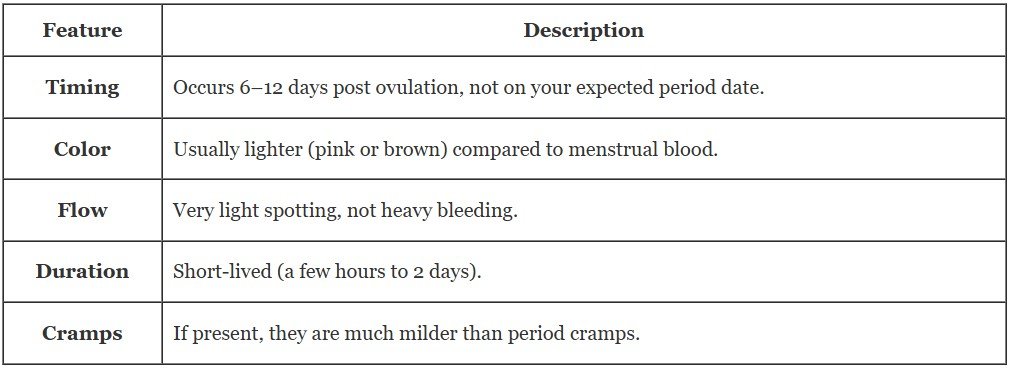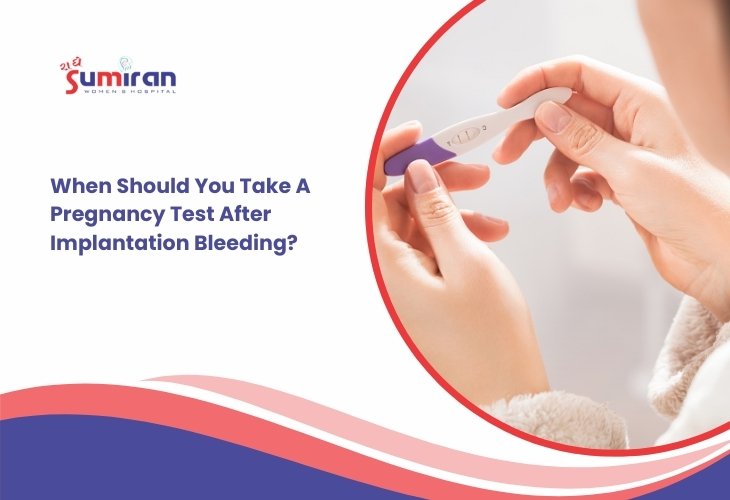Pregnancy can be both exciting and overwhelming—especially when you’re looking for early signs that you might be expecting. One of the most confusing experiences women report is implantation bleeding, a light spotting that occurs when the fertilized egg attaches to the uterine lining. Many women wonder: “If I’ve had implantation bleeding, when should I take a pregnancy test for accurate results?”
In this article, we’ll explore what implantation bleeding really means, how it differs from a period, and most importantly, the right time to take a pregnancy test after implantation bleeding. We’ll also share insights from Sumiran Hospital, a trusted name in women’s health and fertility care.
What Is Implantation Bleeding?
Implantation bleeding is one of the earliest signs of pregnancy, but not every woman experiences it. It happens when the fertilized egg attaches itself to the uterine wall, usually 6–12 days after ovulation.
Key Characteristics of Implantation Bleeding:
- Light spotting (pink, brown, or rust-colored discharge)
- Lasts a few hours to a couple of days
- Lighter than a normal period
- Often accompanied by mild cramping or no pain at all
Many women confuse implantation bleeding with a light period, which can delay testing and cause unnecessary stress.
How Soon After Implantation Bleeding Can You Take a Pregnancy Test?
The most important factor to understand is that pregnancy tests detect hCG (human chorionic gonadotropin), a hormone produced once implantation occurs. However, hCG takes time to build up in your body.
- Best Practice: Wait at least 3–5 days after implantation bleeding before testing for the most accurate results.
- Earliest Time: Some sensitive tests may detect hCG 2–3 days after implantation, but false negatives are possible.
- Most Reliable Time: Taking a test a week after implantation bleeding (or around the time of your missed period) gives the clearest result.
At Sumiran Hospital, fertility specialists often advise women not to rush into testing immediately. A little patience ensures fewer false negatives and provides peace of mind.
Why Testing Too Early Can Be Misleading
Taking a pregnancy test too soon after implantation bleeding can result in a false negative because hCG levels may not have risen enough.
Analogy:
Think of hCG like a “signal light.” After implantation, the body begins switching it on—but if you check too early, the light is still too dim for the test to detect. Waiting gives the hormone enough time to shine bright enough for detection.
Signs That Implantation Bleeding May Have Occurred
Still wondering if what you experienced was implantation bleeding? Here are some distinguishing signs:

If bleeding is heavy or prolonged, it’s more likely your period—or in rare cases, it could indicate other medical conditions. Sumiran Hospital’s gynecologists recommend consulting a doctor if you’re unsure, as early evaluation can prevent unnecessary stress.
The Role of Blood Tests vs. Home Pregnancy Tests
While home pregnancy tests (HPTs) are convenient, they’re not always 100% accurate immediately after implantation bleeding.
- Home Pregnancy Test (Urine Test): Detects hCG in urine; best taken a week after implantation bleeding.
- Blood Test (at a hospital): Can detect even very low levels of hCG as early as 6–8 days after ovulation.
If you need quick, reliable confirmation, visiting Sumiran Hospital for a professional pregnancy blood test is the most accurate option.
FAQs About Implantation Bleeding and Pregnancy Testing
1. Can implantation bleeding and a period happen at the same time?
Not exactly. Implantation bleeding occurs earlier than a period and is usually much lighter.
2. If I have spotting, should I test right away?
It’s better to wait at least 3–5 days after spotting for a more reliable result.
3. Does every woman have implantation bleeding?
No. Only about 25–30% of women experience it. Its absence doesn’t mean you aren’t pregnant.
4. What if I get a negative test after implantation bleeding but still miss my period?
Test again after a few days. If the result is still negative and your period hasn’t arrived, visit Sumiran Hospital for further evaluation.
When to See a Doctor
While implantation bleeding is usually harmless, you should seek medical advice if you experience:
- Heavy bleeding resembling a period
- Severe abdominal cramps
- Dizziness or fainting
- A history of pregnancy complications
At Sumiran Hospital, experienced gynecologists and fertility specialists provide comprehensive pregnancy care, ensuring women receive accurate diagnosis and guidance from the very first signs of pregnancy.
Key Takeaway
If you suspect implantation bleeding, the safest time to take a pregnancy test is 3–7 days afterward, with the most accurate results appearing around the time of your missed period. Testing too early may lead to confusion due to low hCG levels.
Whether you’re planning for pregnancy or simply seeking clarity, the team at Sumiran Hospital is here to guide you every step of the way—with expert care, advanced testing, and compassionate support.
Next Step: If you’ve experienced implantation bleeding and want an accurate pregnancy confirmation, book a consultation at Sumiran Hospital today. Your journey to motherhood deserves the best care from the very beginning.
